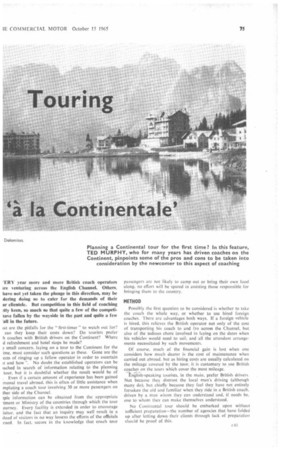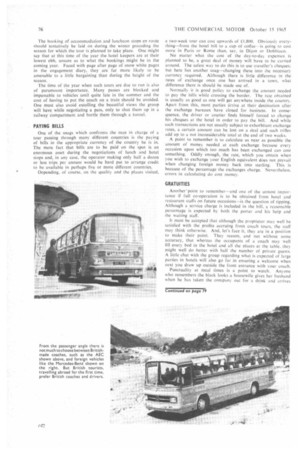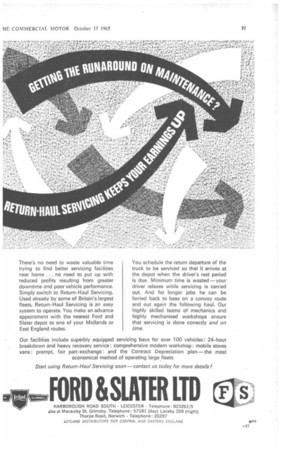V ERY year more and more British coach operators ire venturing
Page 77

Page 78

Page 79

If you've noticed an error in this article please click here to report it so we can fix it.
across the English Channel. Others. have not yet taken the plunge in this direction, may be dering doing so to cater for the demands of their ar clientele. But competition in this field of coaching Aty keen, so much so that quite a few of the competihave fallen by the wayside in the past and quite a few all in the future.
at are the pitfalls for the "first-timer" to watch out for? can they keep their costs down? Do tourists prefer h coaches with British drivers on the Continent? Where d refreshment and hotel stops be made?
small concern, laying on a tour to the Continent for the ime, must consider such questions as these. Gone are the eels of ringing up a fellow operator in order to ascertain I t and how ". No doubt the established operators can be 'ached in search of information relating to the planning tour, but it is doubtful whether the result would be of . Even if a certain amount of experience has been gained .rsonal travel abroad. this is often of little assistance when mplating a coach tour involving 30 or more passengers on ther side of the Channel.
nate information can be obtained from the appropriate tment or Ministry of the countries through which the tour ourney. Every facility is extended in order to encourage isitor. and the fact that an inquiry may well result in a 'load of visitors in no way lessens the efforts of the officials Tried. In fact, secure in the knowledge that coach tour
passengers are not likely to camp out or bring their own food along, no effort will be spared in assisting those responsible for bringing them to the country.
METHOD
Possibly the first question to be considered is whether to take the coach the whole way, or whether to use hired foreign coaches. There arc advantages both ways. If a foreign vehicle is hired. this relieves the British operator not only of the cost of transporting his coach to and fro across the Channel, but also of the tedious chore involved in laying on the dates when his vehicles would need to sail. and all the attendant arrangements necessitated by such movements.
Of course, much of the financial gain is lost when one considers how much dearer is the cost of maintenance when carried out abroad. but as hiring costs are usually calculated on the mileage covered by the tour. it is customary to use British coaches on the tours which cover the most mileage. - t nglish-speaking tourists, in the main, prefer British drivers. Not because they distrust the local man's driving (although many do). but chiefly because they feel they have not entirely forsaken the old and familiar when they ride in a British coach, driven by a man whom they can understand and, if needs be, one to whom they can make themselves understood.
No Continental tour should be embarked upon without sufficient preparation--the number of agencies that have folded up after letting down•their clients through lack of preparation should be proof of this. The booking of accommodation and luncheon stops en route should tentatively be laid on during the winter preceding the season for which the tour is planned to take place. One might say that at this time of the year the hotel keepers are at their lowest ebb, unsure as to what the bookings might be in the corning year. Faced with page after page of snow white pages in the engagement diary, they are far more likely to be amenable to a little bargaining than during the height of the season.
The time of the year when such tours are due to run is also of paramount importance. Many passes are blocked and impassable to vehicles until quite late in the summer and the cost of having to put the coach on a train should be avoided. One must also avoid extolling the beautiful views the group will have while negotiating a pass, only to shut them up in a railway compartment and hurtle them through a tunnel.
PAYING BILLS
One of the snags which confronts the man in charge of a tour passing through many different countries is the paying of bills in the appropriate currency of the country he is in. The mere fact that bills are to be paid on the spot is an enormous asset during the negotiations of lunch and hotel stops and, in any case, the operator making only half a dozen or less trips per annum would be hard put to arrange credit to be available in perhaps five or more different countries.
Depending, of course, on the quality and the places visited, a two-week tour can cost upwards of £1,800. Obviously everything—from the hotel bill to a cup of coffee--is going to cost more in Paris or Rome than, say, in Dijon or Dobbiaco.
No matter what the cost of the day-to-day expenses is planned to be, a great deal of money will have to be carried around. The safest way to do this is to use traveller's cheques: but here lies another snag—changing these into the necessary currency required. Although there is little difference in the rates of exchange once one has arrived in a town, what difference there is should be made use of.
Normally it is good policy to exchange the amount needed to pay the bills while crossing the border. The rate obtained is usually as good as one will get any where inside the country. Apart from this, most parties arrive at their destination after the exchange bureaux have closed for business. In consequence, the driver or courier finds himself forced to change his cheques at the hotel in order to pay the bill. And while such transactions are not usually subject to exhorbitant exchange rates, a certain amount Can be lost on a deal and such trifles add up to a not inconsiderable total at the end of two weeks.
A point to remember is to calculate as near as possible the amount of money needed at each exchange because every occasion upon which too much has been exchanged can cost something. Oddly enough, the rate, which you obtain when you wish to exchange your English equivalent does not prevail when changing foreign money back into sterling. This is because of the percentage the exchanges charge. Nevertheless. errors in calculating do cost money.
GRATUITIES
Another' pointto remember—and one of the utmost importance if full co-operation is to be obtained from hotel and restaurant staffs on future occasions—is the question of tipping. Although a service charge is included in the bill, a reasonable percentage is expected by both the porter and his help and the waiting staff.
It must be accepted that although the proprietor may well be satisfied with the profits accruing from coach tours, the staff may think otherwise. And, let's face it, they are in a position to make their point. They reason, and not without some accuracy, that whereas the occupants of a coach may well fill every bed in the hotel and all the places at the table, they might well do better with half the number of private guests. A little chat with the group regarding what is expected of large parties in hotels will also go far in ensuring a welcome when next you draw up outside the front entrance with your coach. Punctuality at meal times is a point to watch. An one who remembers the black looks a housewife gives her husband when he has taken the company out for a drink and arrives
There's no need to waste valuable time trying to find better servicing facilities near home . no need to put up with reduced profits resulting from greater downtime and poor vehicle performance. Simply switch to Return-Haul Servicing. Used already by some of Britain's largest fleets, Return-Haul Servicing is an easy system to operate. You make an advance appointment with the nearest Ford and Slater depot to one of your Midlands or East England routes. You schedule the return departure of the truck to be serviced so that it arrives at the depot when the driver's rest period is due. Minimum time is wasted—your driver relaxes while servicing is carried out. And for longer jobs he can be ferried back to base on a convoy route and out again the following haul. Our highly skilled teams of mechanics and highly mechanised workshops ensure that servicing is done correctly and on time.








































































































































